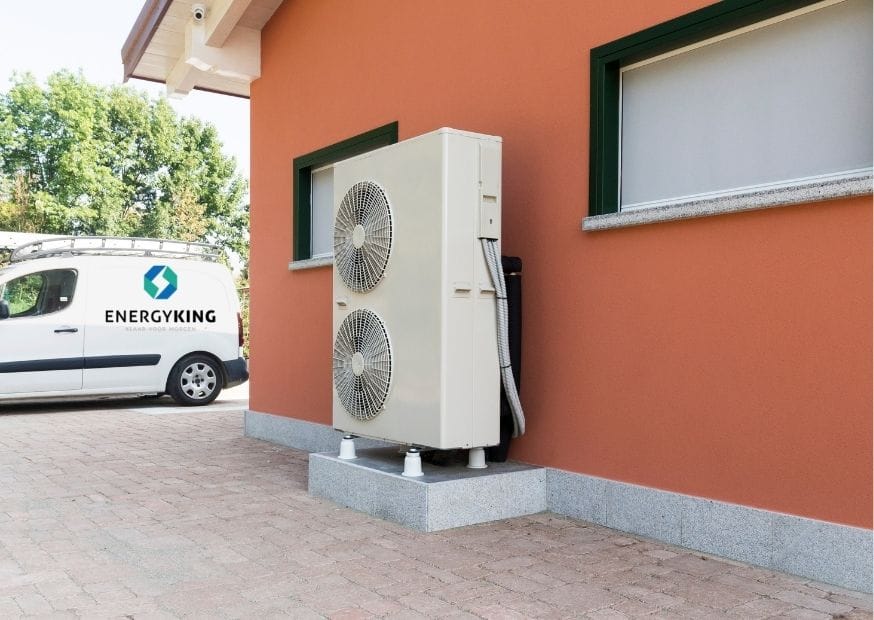
Bijna 1 op 5 Vlaamse nieuwbouwers kiest voor een warmtepomp, en ook in de renovatiemarkt zijn warmtepompen aan een flinke opmars bezig. Zo werden in 2019 43% meer premies toegekend voor warmtepompen dan het jaar ervoor, en werd de nieuwe warmtepompboilerpremie al meer dan 1000 keer uitbetaald.
Is het mogelijk om een warmtepomp te installeren in een bestaande woning?
Warmtepompen kunnen in vrijwel elk huis worden geïnstalleerd, maar er zijn enkele overwegingen waarmee je rekening moet houden, bv met betrekking tot isolatie. Om een warmtepomp zo efficiënt mogelijk te laten werken, moet uw huis goed geïsoleerd zijn. Dit om te voorkomen dat de warmte ontsnapt.
Een huis dat slecht geïsoleerd is, heeft een grotere warmtepomp nodig om het warmteverlies te compenseren. Dit kan meer geld kosten om te installeren en te laten draaien. Bovendien werken warmtepompen efficiënter bij verwarmingssystemen met een lagere temperatuur, zoals bij vloerverwarming. Oudere, slecht geïsoleerde huizen hebben hogere temperaturen nodig dan de warmtepomp aankan om het huis warm te krijgen.
Wil je testen of je huis klaar is om te verwarmen op een lage temperatuur? Verlaag dan 2 weken lang de temperatuur van je verwarmingsketel naar 50 graden en ervaar het zelf. Benieuwd hoe dit juist werkt? Neem gerust een kijkje op deze website.
Een warmtepomp installeren in een nieuwbouwwoning is zelden een probleem. Bij renovatie moet worden gelet op een aantal factoren: wat is de verwarmingsbehoefte, is uw huis voldoende geïsoleerd, is het mogelijk aan te sluiten op de bestaande centrale verwarming, zijn de aanwezige radiatoren of convectoren voldoende gedimensioneerd, is de bestaande centrale verwarming geschikt is als bijverwarming, is de stroomaansluiting monofasig of 3-fasig en is er voldoende vermogen ter beschikking,…
Wanneer je een grond-waterwarmtepomp met horizontaal captatienetwerk overweegt, dan moet er gecontroleerd worden of er voldoende tuinoppervlakte is om zo’n captatienetwerk aan te leggen.
Welk type warmtepomp moet je dan kiezen?
Of je nu best voor een grond-water, lucht-water, water-water, of lucht-lucht warmtepomp kiest hangt af van verschillende factoren. Je budget is steeds het startpunt, dan gaan we kijken naar de verwarmingsbehoefte en de technische kenmerken van de woning. Onze energieadviseurs helpen je graag verder met het zoeken naar de beste oplossing voor jouw woning.
Wat wil je juist verwarmen met een warmtepomp?
Met een warmtepomp kan je kiezen of je alleen de woning wilt verwarmen of het sanitair water. Indien je graag beide wilt verwarmen dan kies je best voor een combimodel die beide opties aankan.
Indien het niet mogelijk zou zijn om je woning met een warmtepomp te verwarmen, dan kan je nog steeds kiezen voor een warmtepompboiler die enkel het sanitair water verwarmt.
Voor welk type afgiftesysteem opteer je het beste?
Vloerverwarming is steeds de beste keuze om te combineren met een warmtepomp. Indien deze configuratie niet mogelijk is, overweeg dan wand- en plafondverwarming, ventilo-convectoren of lage-temperatuurradiatoren.
Nogmaals willen we graag de nadruk leggen op het belang van een goed geïsoleerde woning, om zo het rendement van de warmtepomp te garanderen.
Hoe zit het met vergunningen?
Indien je een warmtepomp wenst te installeren heb je in bepaalde gevallen een vergunning nodig. Je hebt een vergunning nodig indien:
• een grote warmtepomp wordt geïnstalleerd voor huishoudelijke doeleinden met een totale geïnstalleerde drijfkracht meer dan 200 kW.
• Indien grondwater (met pomp- en retourput) als warmtebron wordt toegepast.
• Als een verticale bodemwarmtewisselaar als bron wordt toegepast, waarbij dieper dan 50 meter wordt geboord.
• Als een horizontale of verticale bodemwarmtewisselaar wordt toegepast die een warmtedragend medium met gevaarlijke stoffen bevat. Hieronder valt niet de mengeling van water met glycol.
De verplichting om een milieu- of bouwvergunning aan te vragen hangt af van je woonplaats. Via een database voor de ondergrond in Vlaanderen kan je nagaan vanaf welke diepte je een bepaalde vergunning nodig hebt. Dit kan je hier raadplegen.
Wanneer er geen vergunningsplicht is, zal er vaak wel een melding moeten gedaan worden. Dit is het geval wanneer de warmtepomp een totale geïnstalleerde drijfkracht heeft van meer dan 5 kW en als er gebruik wordt gemaakt van een verticale bodemwarmtewisselaar waarbij maximaal tot 50m wordt geboord.
Heb je interesse of zit je nog met vragen rond een warmtepomp? Aarzel dan niet om ons te contacteren. Wij helpen je graag verder!








